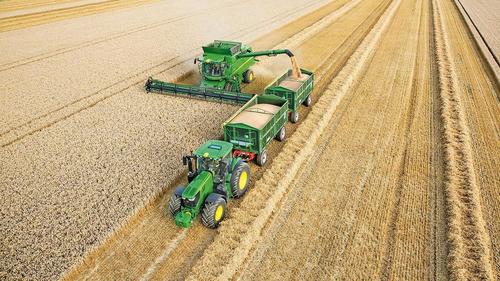by TYLER DURDEN
Multiple John Deere dealerships report part delays for tractors and heavy equipment amid an ongoing strike of more than 10,000 members of the United Auto Workers union at 12 of Deere’s Midwest factories and facilities, according to Bloomberg.
Dealerships note that customers face weeks-long delays for tractor and equipment parts that would typically take several days to fulfill. These parts and components are crucial for farmers to keep combine harvesters and other farm equipment humming during harvest season to stay ahead of the wintry season.
Deere’s situation worsened this week when 90% of union workers rejected its offer that would have ended the walkout, which began in mid-October. Workers are encouraged to seek higher pay because of Deere’s strong earnings.
“It seems general membership feels emboldened by this current political moment of labor power. They’re pushing things further than the union leadership apparently wants to go,” Victor Chen, a sociologist at Virginia Commonwealth University who studies labor, told CBS News. “It’s a gamble, but the economic wind is against their backs, given widespread supply chain problems and the current worker shortage.”
Jon Fisher, a wholesaler of tractors and other machinery in Columbia, South Carolina, said supply chain issues already complicated the picture for procuring parts. Now strikes are a “doubly whammy” where parts are more expensive and harder to find. He said what used to take days now takes three or more weeks.
According to CNN Business, the strike has forced the tractor company to explore whether it can source parts from its 59 foreign factories to satisfy domestic demand while striking continues with no end in sight.
Deere has considered using replacement workers or strikebreakers, a ploy by companies to counteract strikes, but there are few workers in the labor market.
Importing parts from its overseas factories could be the company’s short-term solution to mitigate the disruptions that have forced some farmers to resort to the second-hand market for parts.
The part disruption is problematic for farmers racing to finish corn and soybean harvesting ahead of the winter season. Part delays could begin to prevent fall fieldwork in preparation for spring plantings.






